|
|
|
Sort Order |
|
|
|
Items / Page
|
|
|
|
|
|
|
| Srl | Item |
| 1 |
ID:
115109
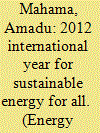

|
|
|
|
|
| Publication |
2012.
|
| Summary/Abstract |
2012 has been declared the "International Year for Sustainable Energy for All" by the UN. While Africa remains the most 'underpowered' continent, the prognosis for a brighter future is looking good, as key stakeholders (governments, private sector, civil society, and the donor community) have mobilized at an unprecedented scale to experiment with new policies, regulatory frameworks, and business models to rapidly upscale access to sustainable energy. The top-down, central grid expansion approach to increasing electricity access is very capital intensive and yet has gained considerable momentum at the expense of lower cost options that utilize decentralized off-grid solutions. A decentralized bottom-up approach could also use indigenous renewable energy sources and foster more significant linkages with livelihood opportunities in the rural un-served territories. This paper evaluates the emerging experiments through the lenses of C.K. Prahalad's "bottom of the pyramid" theory and Clayton Christensen's "disruptive technologies" perspective. Three front-runner initiatives involving new business models, innovative technologies, and institutional capacity building will be analyzed. In addition, the paper examines a regulatory policy initiative designed to stimulate clean energy investments in Ghana. Though the examples are all from Ghana, they illustrate general challenges to sub-Saharan Africa as a whole.
|
|
|
|
|
|
|
|
|
|
|
|
|
|
|
|
| 2 |
ID:
183181
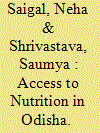

|
|
|
|
|
| Summary/Abstract |
Celebrated as a nutrition champion, Odisha state in India has achieved significant improvements in nutrition of its women and children. The overall progress, however, masks familiar inequities, evidenced in significantly higher levels of stunting, wasting and underweight in children. The article examines access, a key underlying determinant of undernutrition, to two nutrition government schemes of Odisha—the Supplementary Nutrition Programme and Mamata—for the most vulnerable groups in the state’s Angul district. The study identifies limited awareness and lack of proactive disclosure of scheme information, excessive distance from centres that provide the schemes, caste-based power dynamics and weak monitoring institutions as key factors restricting access of specific social groups to these two schemes. The article examines the factors constraining access and considers potential solutions to overcome these bottlenecks in order to provide more effective protection mechanisms.
|
|
|
|
|
|
|
|
|
|
|
|
|
|
|
|
| 3 |
ID:
138260
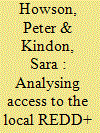

|
|
|
|
|
| Summary/Abstract |
The Reducing Emissions from Deforestation and Forest Degradation (REDD+) project in Sungai Lamandau was Indonesia's first forest carbon finance initiative officially proposed by a community group upon land they intended to control autonomously. However, the flagging carbon market and government licensing obstructions stalled progress towards possible monetary gains. With a focus on the agency of local farmers, we explore the ‘bundles of powers’ that they mobilised to access the other diverse and, at times, elusive set of benefits within the REDD+ project. In the absence of a formal tenure and ‘carbon rights’ regime, local actors' ability to benefit from the project was dependent on social relationships, REDD+ knowledge and access to local markets and capital. The result was a benefit-sharing framework of uneven distribution.
|
|
|
|
|
|
|
|
|
|
|
|
|
|
|
|
| 4 |
ID:
161895
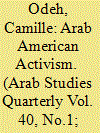

|
|
|
|
|
| Summary/Abstract |
This article provides a first-hand account of Arab American activism from the 1967 war to the present. It focuses on the development and activities of Arab Americans in the metropolitan Chicago area, with particular emphasis on the activities of Arab American and Arab students in the decades after the '67 war. It also describes the alliances forged between African Americans and Arab Americans during those tumultuous decades, as well as offering suggestions for what Arab American activists should do in the future.
|
|
|
|
|
|
|
|
|
|
|
|
|
|
|
|
| 5 |
ID:
079478


|
|
|
|
|
| Publication |
2007.
|
| Summary/Abstract |
We argue a case for a `revisioning' of the education policy-implementation nexus in the South African higher education sector. It is proposed that the well-meaning idealism expressed in policy pronouncements is necessarily subject to a host of mediations, national and international, which have a mutative effect on the original intent. This understanding of policy, as `policy pragmatism', is used to understand the discourse in current South African higher education, which although very `efficiency' driven, retains considerable access elements. The article describes how the initial policy intention of `unfettered' access transmutes to a pragmatic, cautious and guided right of entry. Thus, while initial policy propositions are contained in policy, they are not as overtly discernible as would be anticipated
|
|
|
|
|
|
|
|
|
|
|
|
|
|
|
|
| 6 |
ID:
184804
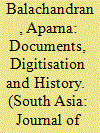

|
|
|
|
|
| Summary/Abstract |
Recent years have seen a very large rise in digitisation projects in various state-administered archives in India, including the National Archives of India and regional archives in different parts of the country. This essay argues that rather than increasing access and transparency, digitisation serves to reproduce and potentially even increase state control over historical sources and memory. In addition, the elision of context in digitised collections in state archives poses problems for historical research, particularly for scholars from less privileged institutions. It is imperative that these efforts go beyond an understanding of digitisation as conservation alone in order to harness the creative and pedagogical possibilities offered by digital technology to influence, and even transform, the historical scholarship of a wide variety of users.
|
|
|
|
|
|
|
|
|
|
|
|
|
|
|
|
| 7 |
ID:
149832


|
|
|
|
|
| Summary/Abstract |
Small Islands Developing States (SIDS) are isolated and surrounded by ocean. The generation and use of energy resources are two very important aspects for the development of SIDS. Unfortunately, most of SIDS do not use their potential in respect of energy resources, and they as a result have to depend on the import of fossil fuels in order to meet their energy needs. This increases the overall vulnerability of SIDS as they have to depend on the rising or fluctuating fossil fuels prices. Some SIDS, especially in the geographically dispersed Pacific region, do not have proper access to energy whereas other SIDS struggle more with energy security issue. At the same time, SIDS are most vulnerable to the impacts and effects of climate change, as they are among the ones to be most severely affected in case of natural calamities and sea-level rise.
|
|
|
|
|
|
|
|
|
|
|
|
|
|
|
|
| 8 |
ID:
151564
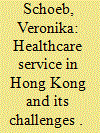

|
|
|
|
|
| Summary/Abstract |
The Hong Kong Special Administrative Region combines a British colonial history within a Chinese cultural context and offers its population a dual system with a comprehensive and efficient public health care system in tandem with private hospitals and practitioners. Multiple challenges are looming: increasing demand for health services due to an aging population, staff shortages at all levels, and an underdeveloped primary healthcare system. Health is determined by multiple factors and is defined as a state of complete physical, mental, and social well-being. In recent years, the medical model of health focusing on pathology and disease has been considered insufficient, and a social model of health has been proposed, relying on a more holistic and broad definition of health. Rather than focusing on individual responsibility for health, the social model emphasises collective responsibility for health. This paper analyses the challenges facing Hong Kong in view of the social model of health. The discussion provides some reflections on medical dominance, the reasons behind limited primary care services, and what steps could be recommended to deliver healthcare services in Hong Kong in line with a more holistic view of health.
|
|
|
|
|
|
|
|
|
|
|
|
|
|
|
|
| 9 |
ID:
120606
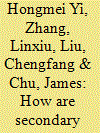

|
|
|
|
|
| Publication |
2013.
|
| Summary/Abstract |
Drawing on a survey of 106 secondary vocational schools and 7309 students in two provinces of China, this descriptive paper assesses whether vocational schooling is measuring up to government benchmarks for quality and whether poor students are able to access quality schools. We find that secondary vocational schools have met government benchmarks for teacher qualification and training, student opportunities for practical training and adequate facilities. Furthermore, poor students access schools of similar quality to non-poor students, even though 34 percent of poor students do not receive financial aid. We conclude that recent policies are successfully ensuring secondary vocational school quality and equity of access to school quality between poor and non-poor students. However, financial aid policies should be re-examined, such that poor students receive sufficient coverage. Moreover, given that input-based measures only proxy school quality, the government should consider holding schools accountable for outcomes such as student learning.
|
|
|
|
|
|
|
|
|
|
|
|
|
|
|
|
| 10 |
ID:
166563
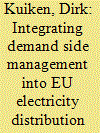

|
|
|
|
|
| Summary/Abstract |
The EU goals for renewable electricity cause significant changes of electrical loads in distribution systems, in which most renewable electricity sources are integrated. This poses a challenge for distribution system operators (DSOs) as their networks are not designed for such load changes. DSOs could use networks more efficiently with demand side management (DSM), where consumers of electricity alter their consumption patterns, shifting (production/consumption) loads in the distribution system. In such a setting, consumers would trade DSM services with the DSOs. However, currently, DSOs follow the ‘copper plate approach’, which assumes the system should have sufficient capacity to ensure that the desired volumes of electricity can be transported. This seeks to guarantee regulated third party access (rTPA) for all system users. Next to rTPA, based on regulated tasks, DSOs should ensure secure, reliable and efficient systems. In doing so, the DSOs are bound by unbundling requirements, which do not allow them to be involved in any activities other than those related to distribution. Therefore, especially production and supply are not allowed. Still, it seems debatable whether EU law allows DSOs to apply DSM, as it has an impact on both the access conditions to the electricity system, and the production, supply and trade of electricity. This article further analyses how DSM relates to the legal framework of DSOs, which obstacles are present, and how DSM could be traded between DSOs and system users.
|
|
|
|
|
|
|
|
|
|
|
|
|
|
|
|
| 11 |
ID:
189541


|
|
|
|
|
| Summary/Abstract |
The Journal of Palestine Studies’ special issue on infrastructure, environment, and health in Palestine sheds new light on the conditions and possibilities of politics. Although it is commonly viewed as “an entity ostensibly separate from technology and other human constructions,” the environment is in fact a particular configuration of “socio-technical arrangements.” The special issue’s four articles and two reflection essays—by Nadi Abusaada, Leena Dallasheh, Samir Harb, Cristina Violante, Nimrod Ben Zeev, and Emily McKee—span historical periods from Ottoman-ruled Palestine to the contemporary era. Hailing from the fields of history, architecture, anthropology, and legal theory, the contributors draw on original archival, spatial, and ethnographic research to parse the realities, experiences, and lessons that Palestine offers beyond its status as a site of settler-colonial deprivation and toxicity. Together they demonstrate that infrastructure, environment, and health are fundamentally and irrefutably political.
|
|
|
|
|
|
|
|
|
|
|
|
|
|
|
|
| 12 |
ID:
121108


|
|
|
|
|
| Publication |
2013.
|
| Summary/Abstract |
This paper presents the experiences of 22 displaced families and their battle for water access based on a pilot survey of Manesar, in the northern Indian state of Haryana. Interviews were conducted in the summer of 2011 to examine a water regime recently transformed by compulsory land acquisition and displacement in one of India's driest and fastest growing areas. This dimension of the land acquisition and displacement narrative is a response to the crisis over resource access and control in peri-urban India where a burgeoning demand for land, water, and capital has sparked contentious debates over fairness and equity. Despite recent amendments to the Land Acquisition Act of 1894, long-standing questions regarding compensation and rehabilitation for drinking water services remain unanswered. The findings of this paper show that there may be limits to halting the effects of land displacement altogether without aggressive legislation capping water grabs, or a radical shift in the way in which water is valued and redistributed to the landless. Conventional alternatives to fulfilling drinking water needs, designed by and for the less poor, such as bottled water, private water tankers, water permit systems, or even land redistribution are likely to exacerbate already limited access, rather than improve it. A number of mitigation techniques are explored, including those inherent to common property resources (CPR), which may ensure access to safe drinking water is maintained.
|
|
|
|
|
|
|
|
|
|
|
|
|
|
|
|
| 13 |
ID:
147459
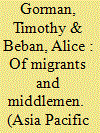

|
|
|
|
|
| Summary/Abstract |
In a possible sign of a new trend in Southeast Asia, economic pressures are driving smallholder shrimp farmers from Vietnam's Mekong Delta across the Cambodian border in search of new land. Building from ethnographic research with Vietnamese shrimp farmers in Kampot province, Cambodia, this paper explores the structures, mechanisms and relations that facilitate and impede the ability of Vietnamese migrants to gain and maintain access to land in Cambodia. The Vietnamese migrants in our study bring capital and farming skills, but their ambiguous legal status and their lack of social networks and experience with the terms of access in Cambodia render them vulnerable to exclusion and dependent on a local broker to mediate their interactions with landowners and authorities. We recount the migrants' attempts to overcome the uncertainty of their mediated access by bypassing the broker and cultivating direct social ties with Khmer villagers, border authorities and the landowners themselves. This study generates new insights into the dynamics of cross-border livelihoods in mainland Southeast Asia and more broadly illuminates the central importance of migrant–broker relationships and migrant agency in seeking to overcome dependency on brokers by forging new social relations in border areas.
|
|
|
|
|
|
|
|
|
|
|
|
|
|
|
|
| 14 |
ID:
180054
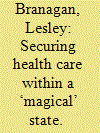

|
|
|
|
|
| Summary/Abstract |
In India, marginalised people with serious or chronic illness face particular challenges to finding sustainable treatment, and often experience financial devastation. One state welfare scheme (the EWS hospital bed quotas) holds the promise of treatment for those in Delhi's margins, through partnerships with corporate hospitals. Yet, the process of gaining access to treatment via the scheme is very frustrating. This ethnography illustrates the ways in which low-income patients’ attempts to lay claim to state services often bring them into play with a mode of the state that is, in anthropologists’ conceptions, opaque, arbitrary and erratic. In response to the ‘illegible’ modes of access to the scheme, patients and their families are compelled to construct and reproduce their eligibility to access treatment, through a repertoire of intricate and entwined practices, namely: the attainment of credible low-income documentation, the use of big men to leverage resources, and different kinds of performance. The burden of enacting these practices is further compounded and troubled by the state scheme's blurry entanglement with the private sector, in which roles and responsibilities for a ‘duty of care’ to citizens with illness are elusive. This paper therefore aims to be an original contribution to the social sciences, in interpreting health-seekers’ experiences of state-private schemes in Delhi within anthropological understandings of the state and marginalised people's meaning-making of illegible state processes.
|
|
|
|
|
|
|
|
|
|
|
|
|
|
|
|
| 15 |
ID:
161892
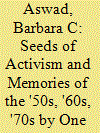

|
|
|
|
|
| Summary/Abstract |
In this article, Aswad describes how she became involved in the Middle East and her ongoing commitment to organizations and programs working for Arab Americans and Palestine. She focuses on the Dearborn area and the ultimately successful struggle to prevent the destruction of the largely Arab American community in the Southend through a program of “urban renewal” which was actually one of “urban removal.”
|
|
|
|
|
|
|
|
|
|
|
|
|
|
|
|
| 16 |
ID:
092783


|
|
|
|
|
| Publication |
2009.
|
| Summary/Abstract |
Provision of modern energy services for cooking (with gaseous fuels) and lighting (with electricity) is an essential component of any policy aiming to address health, education or welfare issues; yet it gets little attention from policy-makers. Secure, adequate, low-cost energy of quality and convenience is core to the delivery of these services. The present study analyses the energy consumption pattern of Indian domestic sector and examines the urban-rural divide and income energy linkage. A comprehensive analysis is done to estimate the cost for providing modern energy services to everyone by 2030. A public-private partnership-driven business model, with entrepreneurship at the core, is developed with institutional, financing and pricing mechanisms for diffusion of energy services. This approach, termed as EMPOWERS (entrepreneurship model for provision of wholesome energy-related basic services), if adopted, can facilitate large-scale dissemination of energy-efficient and renewable technologies like small-scale biogas/biofuel plants, and distributed power generation technologies to provide clean, safe, reliable and sustainable energy to rural households and urban poor. It is expected to integrate the processes of market transformation and entrepreneurship development involving government, NGOs, financial institutions and community groups as stakeholders.
|
|
|
|
|
|
|
|
|
|
|
|
|
|
|
|
|
|
|
|
|